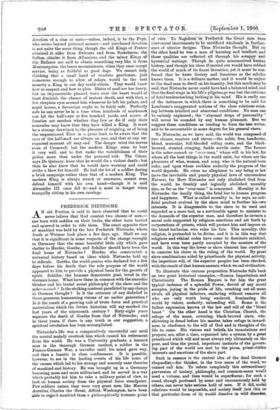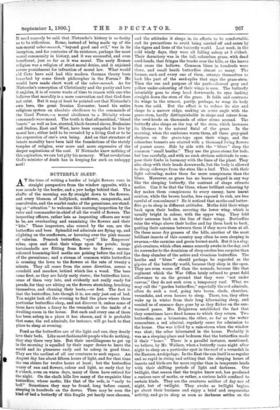FREDERICK NIETZSCHE.
AN old Puritan is said to have observed that he could never believe that God created two classes of men,— one born with saddles on their backs, the other born booted and spurred in order to ride them. The exact opposite view of mankind was held by the late Frederick Nietzsche, whose death at Weimar took place a few days ago. Shall we say that it is significant in some respects of the change wrought in Germany that the same beautiful little city which gave shelter to Herder, Goethe, and Schiller should have been the final home of Nietzsche ? Herder, who constructed a universal history based on ideas which Nietzsche held up to ridicule. Goethe, the world-genius who declared but a few days before his death that the sole purpose of the world appeared to him to provide a physical basis for the growth of spirit. Schiller, the humane democratic poet, loved in the German home. What have these in common with the anarchic thinker and his brutal social philosophy of the slave and the ueber-nzensch ? Is the striking contrast paralleled by any change in German thought ? Is it the outcome of any disbelief in those generous humanising visions of an earlier generation ? Is it the result of a growing cult of brute force and practical materialism which the future historian will say marked the last years of the nineteenth century ? Sixty-eight years separate the death of Goethe from that of Nietzsche; and in these years, if there is any truth in our suggestion, a spiritual revolution has been accomplished.
Nietzsche's life was a comparatively uneventful one until the mental malady overtook him which caused his retirement from the world. He was a University graduate, a learned man in the thorough German method, a soldier in the Franco-German War, a traveller until his mind gave way, and then a lunatic in close confinement. It is possible, however, to see in the leading events of his life some of the causes which led to his strange and scarcely sane theories of mankind and history. He was brought up in a Germany beeoraing more and more militarised, and he served in a war which probably led him to take a military point of view, to look on human society from the physical force standpoint. Few soldiers unless they were very great men, like Marcus Aurelius, Charles the Great, Alfred, Washington, have been able to regard mankind from a philosophically humane point of vieW. To NapolecaCcir Frederick the Great men Were convenient instruments to be sadtificed wholesale in further- ance of ulterior designs. Thus Nietzsche thought. But on the other hand he Was a man of learning and intellect, and these qualities are reflected all through his scrappy and hysterical ' writings. Though he quite mieconceived human history, and though his ideas if carried out would have robbed the world of much of its finest literature, yet it must be con- fessed that he knew history and literature as the scholar knows them. It is a delicate matter, and it would be unjust to the dead man to dwell on his insanity; but this much may be said, that Nietzsche never could have had a balanced mind, and that the final stage in his life's pilgrimage was but the outcome of fatal tendencies long lurking in his mind. His is really one of the instances in which there is something to be said for Lombroso's exaggerated notions of the close relations exist- ing between intellect and abnormal conditions. No man can be entirely explained ; the "abysmal deeps of personality" will never be sounded by any human plummet. But we suggest these conditions as tending to form the late writer, and to be accountable in some degree for his general views.
To Nietzsche, as we have said, the world was composed of two classes, masters and slaves,—the noble, free, handsome, blond, muscular, full-blooded ruling caste, and the black- browed, stunted, cringing, feeble servile caste. The former is the ueber-mensch or "over-man," whose will is his law, for whom all the best things in the world exist, for whom are the pleasures of wine, women, and song, who is the natural-born ruler, and upon whose reckless audacity the progress of the world depends. He owns no allegiance to any being or law (save the inevitable and purely physical laws of unconscious Nature), for Herr Nietzsche not only abolished God from the world, he frankly and logically abolished morality also, so far as the "over-man" is concerned. Morality is for Nietzsche the deadly thing, the fatal bar to human progress and happiness. What is called morality is, he says, an arti- ficial product evolved by the slave mind to further his own interests. It is disagreeable to the slave to be used and regarded as a mere tool, as a serviceable agent to minister to the demands of the superior man, and therefore he invents a moral code supported by religious sanctions and set forth by corporations of priests, which will protect him and impose on the blond barbarian who rules his fate. This morality, this religion, is pretended to be divine, and it is in this way that religious and ethical codes have come to dominate mankind, and have even been partly accepted by the masters of the world. In this way the lower or slave element has contrived to exercise his share in the ruling of the world. By great slave combinations aided by priesthoods the physical activity, the imperious will, of the superior peoples has been checked, with the result of that human anEemia which we call civilisation.
To illustrate this curious proposition Nietzsche falls back on two great historical examples,—Roman Imperialism and Christianity. The Roman Empire is for him the great typical instance of a splendid Power, devoid of any moral scruples, joying in the pride of life, crushing out all mean rivals, all physical inferiors, enslaving without remorse all who are only worth being enslaved, dominating the world by valour, audacity, unbending will. Rome is the fullest expression known of the law and will of the "blond beast." On the other hand is the Christian Church, the refuge of the mean, cowering, black-browed slave, who, shivering in dread before his master, takes refuge in inward- ness, in obedience to the will of God and in thoughts of the life to come. His visions and beliefs, his incantations and prayers, are, after a time, organised into a system by a great priesthood which will and must always rely ultimately on the poor, and thus the proud, imperious instincts of the govern- ing part of the world are met by the pious, priest-ridden interests and emotions of the slave part.
Such in essence is the central idea of the dead German rhapsodist, —for thinker, in the true sense of the word, we cannot call him. To refute completely this extraorainery perversion of history, philosophy, and common-sense would need a volume, and then would be superfluous; for such a creed, though professed by some and unconsciously held by others, can never take serious hold of men. If it did, social relations would be impossible, and society itself (not this or that particular form of it) would dissolve in wild disorder.
It need scarcely be said that Nietzsche's history is so faulty as to be ridiculous. Rome, instead of being made up of the non-moral usber-vnensch, "beyond good and evil," was in its inception, and for centuries of its existence, perhaps the most moral community in history, and it was successful, and even beneficent, just so far as it was moraL The early Roman religion was a religion of strict moral duties, and it enjoined severe punishment for infraction of moral law. What would old Cato have said had this modern German theory been broached by some Greek philosopher in the Forum ? He would have mule short work of the Iteber-mensch. As for Nietzsche's conception of Christianity and the purity and love it enjoins, it is of course waste of time to reason with one who believes that morality is a mere convention and that God does not exist. But it may at least be pointed out that Nietzsche's own hero, the great Iranian Zoroaster, based his entire religious system on absolute obedience to the commands of the Good Power,—a moral obedience to a Divinity whose commands were moral. The truth is that all mankind, "blond beasts" as well as low, stunted, black-browed slaves, Brahmins and Sudras, East and West, have been compelled to live by moral law; either held to be revealed by a living God or to be the expression of one's own being. And on that structure of innate morality have been laid the foundations of the stately temples of religion, ever more and more expressive of the deeper aspirations of the soul. If Nietzsche knew nothing of this aspiration, we can but pity his memory. What revelations God's minister of death has in keeping for such an unhappy soul!



































 Previous page
Previous page